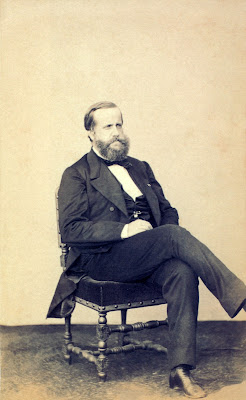.png) |
| Blogger: Amber Lemus |
Last month we introduced the topic of "Brazilian Fever", or the little-known fact that thousands of Southern Americans emigrated out of the country following the Civil War. We discussed the background and motivations for these families to uproot and move to another country. This month we're taking a deeper dive into the lives of the families, and what transpired after they left their homeland for Brazil. If you missed part one, you can view it by clicking here.
.jpg) |
| William Norris Public Domain |
Somewhere between ten and twenty thousand Southerners immigrated to Brazil in the aftermath of the Civil War, many of them settling outside of Santa Barbara, forming a town known as Americana. One of the men to head up this move to Brazil was William Norris. William was originally from Georgia but had moved to Alabama to become an influential member of society there. Not only did he serve as a senator of the Alabama legislature, but also served as a representative in the State House. He was also elected Grand Master of the Alabama Masonic Lodge.
Norris was the owner of a cotton plantation, so in the aftermath of the Civil War, he couldn't imagine spending his life under the government of the Union, especially with the loss of slave labor. He decided to travel to Brazil to investigate the claims that the emperor would grant them land and other incentives to move their cotton operation there.
On December 27, 1865, Norris, his son, and his brother arrived in Rio De Janero. They found a plot of land they liked, that apparently reminded them of Alabama, and founded a settlement. They purchased slaves and started farming cotton once again. Norris sent a glowing report back home, and by 1867, the rest of his family had moved to Brazil as well, along with many other families from the region. They brought watermelon plants to Brazil and enhanced the agriculture in the area. Somewhere around 54 families moved to Brazil and purchased over 530 slaves upon arrival. Although not all of the families settled in Americana, this town was one of the only settlements to actually survive and thrive.
 |
| By Steagall - Imigrantes Americanos no Brasil, PD-US |
At its peak in the late 1800's, Americana was home to over 3500 "Confederados" as they were called in Brazil. Naturally, the settlement began with a very isolated culture, the families worshipping and marrying only amongst each other, but as the new generations reached adulthood, they were more likely to leave the colony for the larger Brazilian towns, intermarry with Brazilians, and assimilate into Brazilian culture.
 |
| The Norris House - First house of Confederate immigrants in the colony. Public Domain |
The Confederados also brought a lot of good to Brazil. “They enriched our society with their progressive mind, their capacity for action, and their technical competence, and perhaps in the hearts of their São Paulo descendants has filtered a little of that love of freedom, an American tradition, and that pride of the old planter that is a Southern tradition.” sociologist Jose Arthur Rios observed in 1947. They introduced many new foods such as pecans, Georgian peanuts, and watermelons. They brought tools and innovations to the country such as modern dentistry, kerosene lamps, agricultural machinery, and even blood transfusions which the Brazilian people had never seen before. They established Protestantism and founded churches, cemeteries and schools. Public schools had not been introduced to Brazil until this time, and it was also a foreign concept to permit girls to attend and become literate as well as the boys, a barrier that the Confederados plowed right through.
 |
| Descendents dressed in Confederate attire during the yearly festival in Americana, Brazil By Felipeattilio - Own work, CC BY-SA 3.0 |
Today, the main remnant of these Confederate immigrants is the pageantry, music, and most interestingly, its flag. Each year, the town of Americana holds a festival to honor the founders with traditional Civil-War Era attire, foods, dances and music. The proceeds from this festival go to fund the upkeep of the cemetery. The festival has become a controversial topic, however, due to the proud display of Confederate flags, uniforms, etc. While some say that their intent is to celebrate their heritage and keep it alive, others feel it also celebrates the hatred and racism that the Confederados represented.
Regardless, it is an interesting thread of history and I hope you enjoyed learning about it.
*****
Two-time winner of the Christian Indie Award for historical fiction, Amber Lemus inspires hearts through enthralling tales She has a passion for travel, history, books and her Savior. This combination results in what her readers call "historical fiction at its finest".
She lives near the Ozarks in her "casita" with her prince charming. Between enjoying life as a boy mom, and spinning stories out of soap bubbles, Amber loves to connect with readers and hang out on Goodreads with other bookish peoples.
Amber is a proud member of the American Christian Fiction Writers Association. Visit her online at http://www.amberlemus.com/ and download a FREE story by subscribing to her Newsletter!


.png)

%20(1).jpg)
